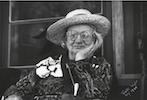Judith Wright, a fifth generation Australian, was born at Thalgarrah Station, near Armidale, New South Wales. Her ancestors arrived in Australia during the 1820s and 1830s and established several large properties in the Hunter and New England regions. Wright was educated at home and at the New England Girls School in Armidale before attending the University of Sydney between 1934 and 1936. Here she studied philosophy and English literature, and pursued her literary interests, editing the school magazine. After travelling in Europe, she returned to Sydney in 1938 and began secretarial work. By this time she had published a number of poems. During the next five years her poetry appeared regularly in newspapers and periodicals such as the Sydney Morning Herald, the Bulletin and Meanjin Papers.
Between 1943 and 1947 Wright lived in Brisbane, Queensland, and for some time played an unpaid secretarial role for Meanjin Papers. This brought her into contact with a number of writers with whom she remained friends. She also met the self-educated philosopher, Jack McKinney, beginning a personal and intellectual relationship that would have a significant influence on her poetry.
In 1946, Wright published the poetry selection The Moving Image, the first of many publications she would produce over the next fifty years. A diverse range of work followed, including novels, short stories, criticism and anthologies. But her most significant work is found in her twenty-odd volumes of poetry. Her status in Australian literature has been acknowledged by many fellowships, awards and honours which have enabled her to concentrate on her writing. Her commentary on Australian poetry and major Australian poets has enhanced this status. These achievements have been accompanied by her direct involvement in debates on conservation issues and Aboriginal rights.
Judith Wright is widely known for a few frequently anthologised poems from her early publications. Wright's sixty year career shows a consistent exploration of several major themes that reward close reading. Her poetry, as a whole, exhibits a developing philosophical investigation into the relationship between language and cognition. Following the basic premises of Romanticism, much of Wright's poetry attempts to maintain a balance between the image produced by language and the object in nature. This investigation is informed by Wright's experiences of war, birth, death, love and the degradation of the environment by European settlement.
Wright lived for many years at Tamborine Mountain with Jack McKinney (1891-1966) whom she married in 1962. In 1976 she moved with her daughter, Meredith, to Braidwood, New South Wales.
 3858928928349763606.png
3858928928349763606.png

